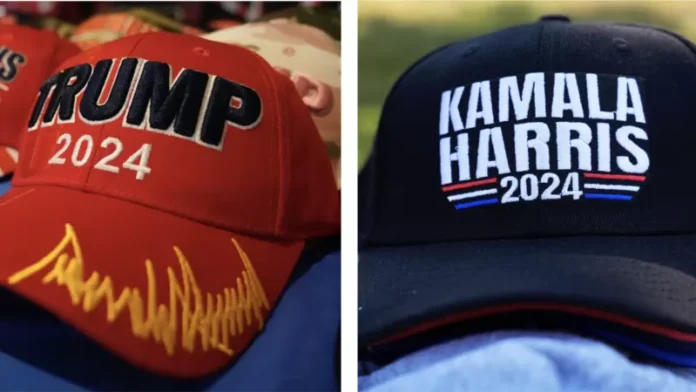As the United States presidential election enters its final phase, supporters of both candidates are proudly displaying their allegiance through the use of election merchandise. From “Make America Great Again” hats to “Childless Cat Lady for Harris” T-shirts, these items have become a popular way for voters to express their political views. However, what many may not realize is that a significant portion of these products are actually made in China.
With the rise of e-commerce platforms, Chinese traders have flooded the market with cheap election merchandise, making it difficult for American manufacturers to compete. This has raised concerns about the impact on the U.S. economy and the integrity of the campaigns’ promises to support American-made products.
Ben Waxman, founder and co-owner of American Roots, an American apparel company, expressed his concerns about the influx of Chinese-made election merchandise. He stated, “I think the amount of stuff on Amazon and Etsy that’s coming from China and other countries in cargo ships and unloaded on American shores is drastically impacting American manufacturers’ ability to compete and grow our own business. I think it’s dramatic.”
Waxman’s concerns are not unfounded. While he would not disclose specific figures, he did mention that his U.S.-made campaign T-shirts sell for around $15 each, while similar products on Chinese online retailer Temu can be found for as little as $3. This stark difference in prices highlights the challenges faced by American manufacturers who must adhere to higher wages and environmental standards.
The issue of Chinese-made election merchandise is not limited to just one candidate. Both the Trump and Harris campaigns have faced criticism for selling products made in China, despite their promises to only offer American-made merchandise. On Temu, tens of thousands of election-themed items have been sold at a fraction of the price of the official campaigns’ versions. For example, a “Make America Great Again” hat on Temu costs less than $4, while the official Trump campaign store website sells them for $40 each. Similarly, Temu’s “Kamala Harris 2024” hats can be found for less than $3 each, while the official Kamala Harris campaign store website sells “Kamala” hats for $47 each.
The stark contrast in prices highlights the challenges the U.S. faces in reducing its dependence on Chinese products and closing a trade loophole, known as the de minimis loophole, that allows Chinese companies to ship goods worth less than $800 to the U.S. without paying import duties. This loophole has been heavily criticized by the National Council of Textile Organizations (NCTO), a labor union-aligned organization, who stated that the abuse of this loophole has led to the loss of 21 manufacturing operations in the past 18 months.
When asked for comment, both the Trump and Harris campaigns did not respond. This raises concerns about the campaigns’ commitment to supporting American-made products and the impact of their actions on the U.S. economy.
The issue of Chinese-made election merchandise also highlights the irony of the two U.S. presidential candidates talking tough on trade with China while their own followers are buying China-made products to show their support for them. Mitch Cahn, president of Unionwear, a New York-based apparel company that has supplied more than 300,000 baseball caps to Harris’ campaign, stated, “If someone is supporting a candidate because of that candidate’s economic policy and their position toward improving our economy and improving our environment and improving our labor conditions, and doing so by increasing the amount of domestic manufacturing, and then they’re supporting a candidate by buying a product that’s made in a country that stands for the opposite of that, they’re actually doing themselves and the candidate and the economy a disservice.”
One of the main reasons for the prevalence of Chinese-made election merchandise is the fact that anyone can produce and sell these products, as the campaigns do not control their intellectual property. This has led to a flood of Chinese-made products on the market, as there are not many manufacturers in the U.S. who can produce these items. This issue was highlighted by the Associated Press, who reported that thousands of Donald Trump’s “God Bless America” Bibles were printed in China. This revelation has raised questions about the integrity of Trump’s “Made in the USA” campaign.
Political consultant and CEO of Engage Voters U.S., Marc Zdanow, stated, “In past [election] years, this would’ve been a scandal. I think Trump voters just

